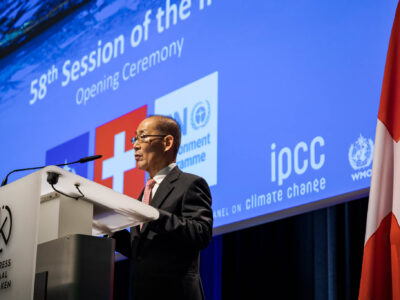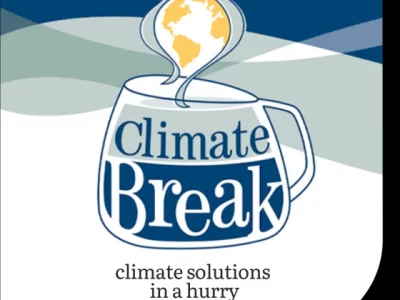Region: International
The IPCC Should Just Say 1.5 C is Dead
The big takeaway from the IPCC’s latest report is that we’re still falling behind and must do hard things to catch up. It’s time to communicate that differently.
“There is a rapidly closing window of opportunity to secure a livable and sustainable future for all,” according to the IPCC’s AR6 Synthesis Report. That phrase spoke to the parent in me, though maybe not for the sentimental reason you might think. Most mornings I find myself repeating some version of “there is a rapidly …
Continue reading “The IPCC Should Just Say 1.5 C is Dead”
CONTINUE READINGSolar Geoengineering in the News — Again and Again
An update on the serious and the silly
Solar geoengineering has been prominent in the news lately. It looks like the long-predicted spike of attention to these potential climate responses may finally be starting – with many attendant opportunities for controversy and confusion. For background on solar geoengineering, why it’s important to research, and what the debates over it are, check out various …
Continue reading “Solar Geoengineering in the News — Again and Again”
CONTINUE READINGTop 5 Climate Reasons To Reduce Driving, Even With Electric Vehicles
Sprawl and EVs still have significant carbon costs
California and other jurisdictions have been moving to reduce vehicle miles traveled (VMT) as a climate solution. Yet some pro-sprawl interests question whether this is necessary, given the advent of electric vehicles. It’s fair to ask: if all vehicles are “zero emission,” do we really need to care any more about how much driving we …
Continue reading “Top 5 Climate Reasons To Reduce Driving, Even With Electric Vehicles”
CONTINUE READINGClimate Policy’s “Plan B”
As the initial top-down approach failed, a new approach to climate policy crystalized.
My last blog post told the story of the original top-down approach to climate policy. It was supposed to feature binding restrictions on carbon emissions in a global treaty and federal legislation. By 2012, it was plain that neither half of this “Plan A” strategy was in the offing. Building on trends that had begun …
Continue reading “Climate Policy’s “Plan B””
CONTINUE READINGClimate Policy at the Turn of the Century: The Death of “Plan A”
The original plan involved top-down global and US emission limits. They never happened.
When the campaign to cut carbon emissions began in the last decade of the 20th Century, there seemed to be a clear path forward. International negotiations would begin with a framework convention, followed by a later global agreement capping carbon emissions. Within the US, Congress would enact legislation cutting carbon emissions. By the end of …
Continue reading “Climate Policy at the Turn of the Century: The Death of “Plan A””
CONTINUE READINGNeed Quick Climate Solutions? Check Out Our “Climate Break” Podcast
Berkeley Law production also airing every Thursday on NPR-affiliate KALW in San Francisco
Climate change news is often quite depressing, with frequent stories on the science and ever-worsening impacts. What gets lost in this otherwise important coverage is the amazing and inspiring tales of innovation and solutions happening all around us, in every sector and walk of life. That’s why Berkeley Law’s Center for Law, Energy and the …
Continue reading “Need Quick Climate Solutions? Check Out Our “Climate Break” Podcast”
CONTINUE READINGShould There Be a ‘Non-Use’ Agreement on Solar Geoengineering?
Why I signed the call for a non-use agreement, and what that might mean for research.
Although I’m a newbie at the Emmett Institute, I have been working on geoengineering for a decade now. I have heard countless arguments over whether and how solar geoengineering could be useful in the struggle to manage climate change. I have seen deeply misleading claims by both its supporters and detractors, many trying to coopt …
Continue reading “Should There Be a ‘Non-Use’ Agreement on Solar Geoengineering?”
CONTINUE READINGI’m With Paul
Krugman claims that climate action doesn’t mean an end to growth. He’s right.
In a recent column, Paul Krugman argued that cutting carbon emissions doesn’t have to mean an end to economic growth. He’s right about that. Carbon emissions and growth aren’t joined at the hip. He could have added that economic growth and quality of life don’t necessarily go together. The numbers are really clear about the …
Continue reading “I’m With Paul”
CONTINUE READINGThis Climate Debate is a lot of Hot Air
Geoengineering is having a moment. But much of the media coverage is failing to capture the actual debate.
We’ve been hearing a lot lately about geoengineering – the various scientific theories and governance ideas that could eventually lead to technological interventions to help cool the planet. A weather balloon stunt in Mexico by a small startup called Make Sunsets generated a lot of hot headlines, even though that solar geoengineering “experiment” was so …
Continue reading “This Climate Debate is a lot of Hot Air”
CONTINUE READINGHow California (and the World) Get to 30×30
COP15 in Montreal ended with a pledge to protect 30 percent of the planet by 2030. UCLA student analysis shows what we can learn from California’s own plan.
By Ashley Anderson, Elana Nager, and Madeline Ward As 2022 wound down, the United Nations Biodiversity Conference (COP 15) convened in Montreal. The conference ended with around 190 of the world’s nations adopting the Kunming-Montreal Global Biodiversity Framework, which establishes four goals and twenty-three targets to be achieved by 2030. The most prominent of these …
Continue reading “How California (and the World) Get to 30×30”
CONTINUE READING













